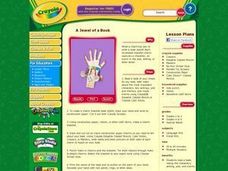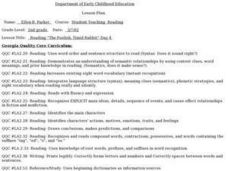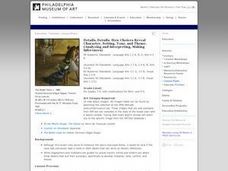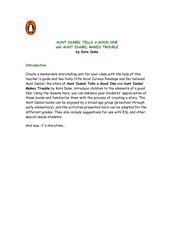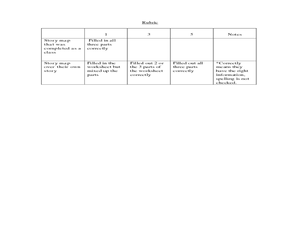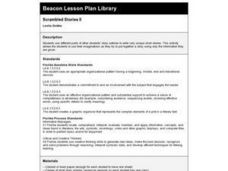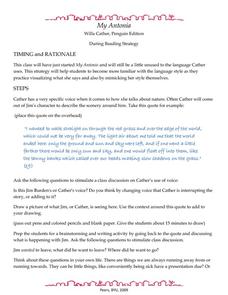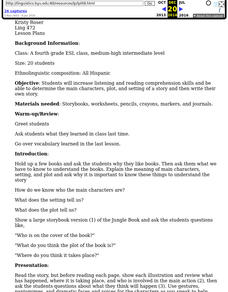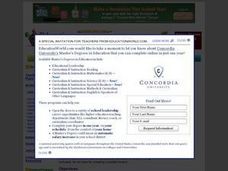Curated OER
Lesson 2: Using Setting to Make Predictions about Characters
Fourth graders look at the importance of setting in a story. In this setting activity, 4th graders see how the setting of a story affects the actions of the characters and how you can predict these actions based on the setting. They read...
Curated OER
Setting's Effect on a Character's Actions
Do the actions of a character in a story change based on the setting the writer provides? Learners explore the concept of character action in relation to story setting by investigating the setting and events in the story Science...
Curated OER
A Jewel of a Book
Students read a book, noting the characters, setting, plot, and events. They gather, synthesize, and then select the most important data from their book to prepare a book report by decorating a charm bracelet with pertinent information...
Curated OER
Story Plan Graphic Organizer
In this story planner graphic organizer worksheet, students fill in the genre, characters, setting, plot, complication and resolution before they use the information to write a story. They also list useful words that will be used.
Curated OER
Pop-Up Puppets
Students read "Peter Spier's Circus!" and identify the literature's setting and characters. They work in small groups to create a circus stage set and puppets based on their reading. Students perform a puppet show using their set and...
Teach with Movies
Teaching Students to Write a Narrative
Encourage narrative writing with a clever exercise. Class members watch episodes from movies and describe what happened to a character, including details about the setting, plot, and characters. Writers then craft a narrative about a...
Generation Rx
My Generation Rx: Plot Twists
How can prescription drugs be dangerous if they were prescribed by a doctor? Is it okay to share your prescription drugs with friends if they really need them? Clear up any common misconceptions about prescription drugs with a set of...
Curated OER
Plot Development
Students identify the elements of plot and write a script with a strong plot. For this plot lesson, students identify elements of plot in examples by completing a chart and a graphic organizer. Students then create plots from...
Curated OER
Story Setting - The Art Lesson by Tomi dePaola
Students read the book The Art Lesson by Tomi dePaola and analyze the story. In this setting lesson, students discuss the importance of the setting and how it helps us understand the story. Students answer questions and chart their...
Curated OER
Language Arts: Plotting Stories
Second graders read the story, "The Foolish, Timid Rabbit," as part of a unit on appearances. After reading with partners, they write their own stories that include elements about some forms of matter from their science studies. Students...
Curated OER
Plot/Story Problem/Resolution
Students analyze the plot, problem, and resolution of a story. In this story analysis lesson, students read stories and fill out graphic organizers about the plot, story problems, and resolution.
Curated OER
Details, Details: How Choices Reveal Character, Setting, Tone, and Theme. (Analyzing and Interpreting, Making Inferences)
Students respond to works of art. In this art interpretation instructional activity, students examine images of art while using concepts they learned as they read literary pieces. They detail the setting, characters, and the mood and...
Curated OER
Adventure Writing: Oregon's Landscape as a Setting
Learners identify geographical features of different regions encountered by migrants on the Oregon trail. Students research how the Oregon landscape may have affected life and 19th century westward migration. Learners write a narrative...
Curated OER
Aunt Isabel Tells a Good One...
Explore language arts by reading two similar stories in order to compare and contrast them in class. Young readers read two Aunt Isabel books, by Kate Duke, and discuss the main characters, plot, and setting. They complete a graphic...
Curated OER
Story Stew
Learners identify the elements of a story. In this reading and writing lesson, pupils read the book, Tyrone the Horrible by Hans Wihelm and then identify the characters, setting, and plot of the story.This lesson includes adaptations and...
Curated OER
Scrambled Stories II
Review story elements with your class. They will use examples from a story to develop critical-thinking questions. Then they use a graphic organizer to describe the setting, character, and plot of the story, focusing on how they...
Curated OER
The Similarities and Differences of Setting
Sixth graders identify components of the setting in science fiction text. In this compare and contrast settings instructional activity, 6th graders read Only You Can Save Mankind and identify similarities and differences between...
Curated OER
The News Behind the Story
What a fun way to analyze plot, setting, and character. Learners review story elements, read a short fictional story, then turn the events of that story into a headlining news paper article. Not only does this lesson engage critical...
Curated OER
My Antonia: During Reading Strategy
Home in on the quote on this page to explore setting, the author's and character's voices, and plot in Willa Cather's My Antonia. Pupils draw a picture of what is described in the quote, discuss the content, and make connections to their...
ReadWriteThink
Comics in the Classroom as an Introduction to Narrative Structure
A picture is worth a thousand words, but a comic strip combines both images and words for the ultimate narrative effect. After reading The Three Little Pigs and deciphering the plot elements, elementary readers work through four...
Curated OER
Language Practice
The simple instructional techniques described in this plan will help young readers learn and practice basic reading skills and strategies. Before reading, introduce your readers to the meaning of main character, setting, and plot. Then...
Curated OER
What Makes a Novel a Novel?
They always say to write what you know. This approach is used to get middle schoolers prepared to write novels of their own. Using a favorite book as a model, potential novelists respond to prompts that ask about characters, plot, main...
Curated OER
Story Pyramids
Young writers generate descriptive words. They use pictures of various landscapes (from books, magazines, or the Internet) and complete a story pyramid. The pyramid (included here) asks to describe the main character, the setting, and...
Curated OER
Fortune Cookies Motivate Writing
Fortune cookies are used as motivation for a story. In this creative writing lesson, young writers review the six traits process. They discuss interesting characters, setting, problem and solution in a story. Original stories based on...


